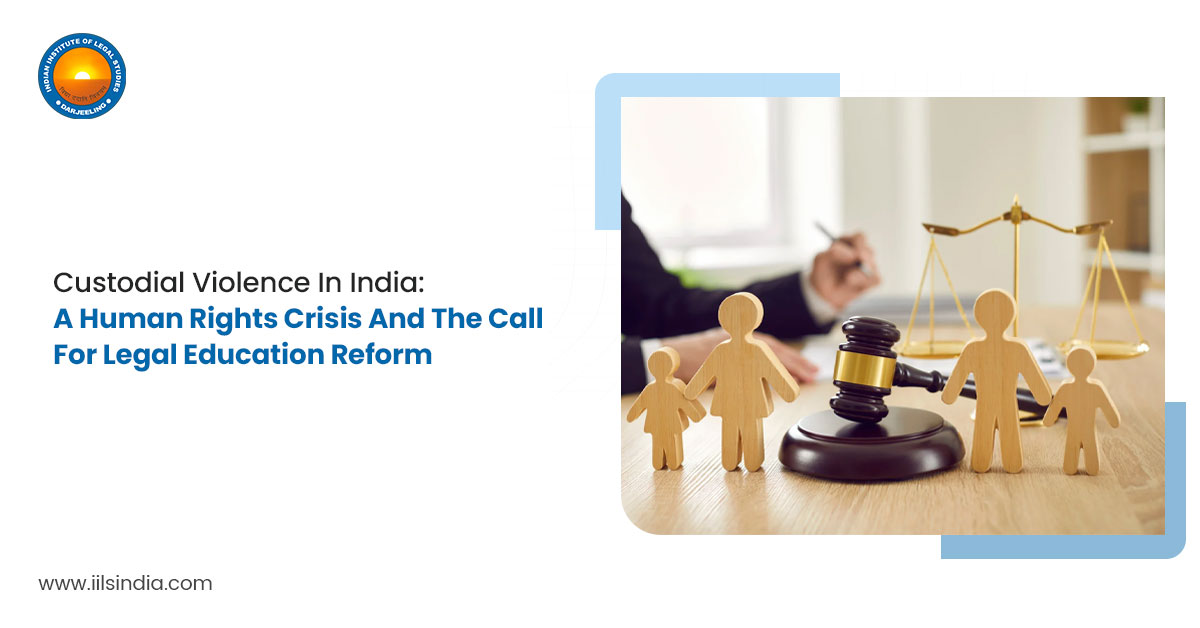Custodial violence-encompassing torture, ill-treatment, and deaths in police or judicial custody-remains one of India’s gravest human rights challenges. Despite constitutional guarantees and judicial interventions, the persistence of such abuse exposes deep flaws in both policing and legal education. It is time for a paradigm shift, not only in law enforcement but in how we prepare future lawyers and policymakers to defend human dignity.The Indian Institute of Legal Studies Cooch Behar one of the finest Law colleges in Cooch Behar have a pivotal role in shaping the values and competencies of future legal professionals.
The Stark Reality of Custodial Violence
Custodial violence is not just a legal issue; it is a humanitarian crisis. India witnesses an alarming number of custodial deaths each year. Reports indicate that, on average, five people die in custody every day. The infamous case of Jeyaraj and Bennix in Tamil Nadu, where a father and son died after brutal police torture, shocked the nation and reignited the debate on police accountability and the protection of fundamental rights.
India’s legal framework, while robust on paper, is riddled with implementation gaps. The Constitution, through Article 21, guarantees the right to life and personal liberty, a right repeatedly affirmed by the Supreme Court in cases like D.K. Basu v. State of West Bengal, which laid down guidelines to prevent custodial torture.
Yet, these laws are often ignored in practice. Investigations into custodial deaths are frequently superficial, with police officers rarely held accountable. Only about 5% of police personnel accused of custodial deaths have been convicted over a 16-year period. The absence of a standalone anti-torture law and India’s failure to ratify the UN Convention Against Torture further weaken protections.
The Role and Responsibility of Legal Education
The persistence of custodial violence is not just a failure of policing, but also of legal education. The Indian Institute of Legal Studies Cooch Behar one of the finest Law colleges in Cooch Beharhave a pivotal role in shaping the values and competencies of future legal professionals.
Why Legal Education Reform is Essential
Sensitization: Law students must be sensitized to the realities of custodial violence and the importance of upholding human rights.
Curricular Integration: Human rights law, police accountability, and forensic investigation should be core components of legal education, not electives.
Practical Exposure: Legal aid clinics and internships with rights organizations can give students hands-on experience in defending victims of state abuse.
Recent recommendations by parliamentary committees and education experts call for a global, interdisciplinary curriculum and the establishment of a National Council for Legal Education and Research to modernize and regulate legal education in India.
Conclusion and Suggestions
Ending custodial violence requires a multi-pronged approach:
- Enact comprehensive anti-torture legislation and ratify international conventions.
- Strengthen independent oversight and accountability mechanisms for police conduct.
- Reform legal education to prioritize human rights, practical training, and social justice advocacy.
Legal education must be at the forefront of this transformation, producing lawyers and leaders who will not only interpret the law but also challenge injustice and defend the vulnerable. Custodial violence is a blot on India’s democracy. Only by reforming our legal education and holding institutions accountable can we hope to eradicate this grave violation of human rights and move closer to the ideals enshrined in our Constitution.

